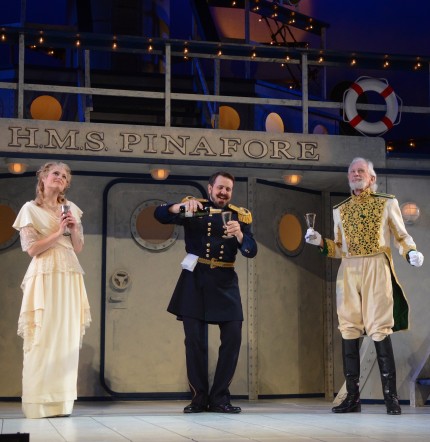Despite some staging crosswinds, Light Opera Works sets sail with mostly solid “Pinafore”

In its time, H.M.S. Pinafore was not only a biting satire on the class distinctions that were part of the established social order of Victorian England, but the work was also the first mega-success of its co-creators, William S. Gilbert and Arthur Sullivan.
Although much of Pinafore is merely a foretaste of the ultimate marriage of melody and chatter that would come to be the duo’s trademark, the work remains a wonderful feel-good show that really does, well, make you feel good.
And of course, it’s always nice to see Light Opera Works doing light opera—in this case, it’s first full-length operetta in two years and the only work in the genre during a season of popular musicals, as has become the established company pattern.
One innovative aspect of director Rudy Hogenmiller’s current production is the idea of an African-American Little Buttercup, played by Dawn Bless. This is not merely a case of colorblind casting, which many other area companies practice — four of the twelve chorus of sailors are black, for instance — but in this case, Buttercup is reimagined as an evocative figure from the far outreaches of the British empire.
Not the smooth mezzo-soprano sensibility we are used to hearing in this role, it was ironically when Bless tried to sound operatic, such as in “I’m called Little Buttercup” that the portrayal became problematically riddled with unpredictable vibrato. When she kept to a steady center for her voice, which is really more of a pop-infused, gospel-like timbre and technique, it worked far better.
It has become a given that senior leads will be played by James Harms at Light Opera Works, and here, Harms’ take on Sir James Porter was given a prominence in the staging that sometimes superseded the character’s role in the work itself.
At the time, audiences loved the role because it was a sendup of real-life First Lord of the Admiralty W. H. Smith, a politician with no nautical experience who had nonetheless been put in charge of the royal navy; indeed, he became so associated with his satirical operetta character that the lord notoriously came to be known as “Pinafore Smith.”
Rather than arrogantly boasting about being an admiral despite never having been to sea as the character was originally conceived, Harms’ Porter tries to hide that fact by sheepishly coming on board as a stowaway in civilian clothes who then whispers the repeated lines about his position as if he has enough of a conscience to care what others might think. The chorus, in turn, inaudibly whispers their repeated affirmations, which worked neither musically nor dramatically.
Harms certainly lent considerable comedy to his portrayal and sang the role well, but this general conception of the character seemed superimposed over the storyline.
The Captain of the Pinafore was played by Michael Cavalieri, not only a fine comic actor, but who sang with a baritone that sounded quite luxurious for a role that more often emphasizes comedy over vocalism.
Tenor Dane M. Thomas made a wonderful leading man Ralph Rackstraw, tongue firmly in cheek and a clarion sound throughout. Soprano Sarah Kelly was a bit less vocally predicable as heroine Josephine, but when she wasn’t oversinging or swallowing her consonants, was at her most effective.
Roger L. Bingaman led the orchestra and onstage chorus with enthusiasm, precision and humor, the quality of the diction of the chorus crisp enough that every word could be plainly heard.
Light Opera Works’ H.M.S. Pinafore runs through June 16 at Northwestern University’s Cahn Auditorium, 600 Emerson St. (at Sheridan Rd.), Evanston; light-opera-works.org; 847-920-5360.
Posted in Uncategorized




